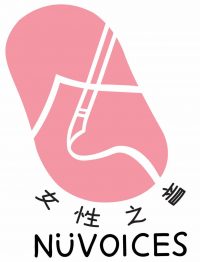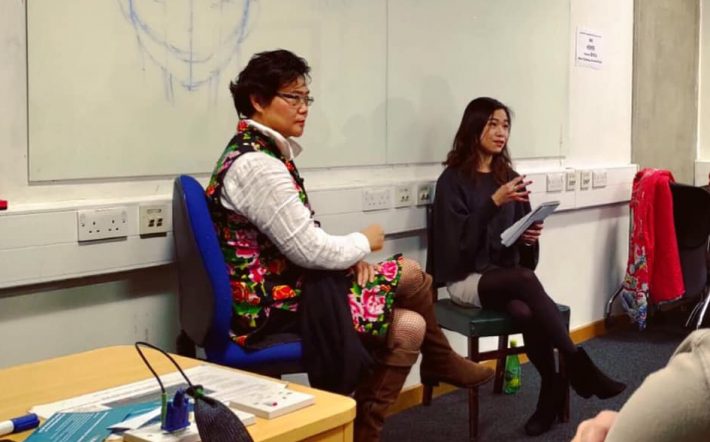BY NERYS AVERY
NüVoices board member and author Lijia Zhang gave a fascinating insight into the lives of prostitutes in contemporary China at a wanel (women panel) moderated by Hong Kong writer and board member Jessie Lau. Drawing a packed audience of over 40 attendees, the event was hosted by NüVoices at the School of Oriental and African Studies in London, courtesy of Aki Elborzi, on November 7th.
Inspired by her grandmother’s deathbed revelation that she had been sold to a brothel in her youth, Lijia decided to write a book about prostitution in modern China. The novel, published in 2017 under the title Lotus, is a tribute to her grandmother and aims to give sex workers a ‘human face,’ she said. Lotus was featured by the BBC’s World Book, and was listed on NPR’s list of Great Reads in 2017.
In an introduction to the book and through a lively Q&A session, Lijia told a packed audience how her research took her across China, from Beijing in the north to Shenzhen, the City of Sins, in the south, gaining the trust of dozens of prostitutes of all ages to reveal their innermost feelings about being part of the world’s oldest profession.
Her book and the story of contemporary sex workers is told through the life of Lotus, a young migrant worker who becomes a prostitute after realizing this is the best way to earn the kind of money she needs to support her brother’s education and give herself a better life.
As long as China calls itself a socialist country it will be impossible to legalise prostitution but the country must improve the legal rights of sex workers and stop sending them to detention centres, @zhanglijia64 tells #nüvoiceswanel during a talk about her book Lotus
— NüVoices 女性之音 (@NuVoices) November 7, 2019
Prostitutes are known in Chinese as ‘ji’, which means chicken, a degrading term, Lijia said. Stigmatised by society and often forced into prostitution by adversity such as an abusive marriage or poverty, they live their lives in fear – of being arrested by the police and thrown into detention centers for ‘education’, of their families discovering their ‘shameful’ profession, of being beaten up by clients or having their money stolen. To deal with the trauma of prostitution, they often turn to religion which offers them a ritualised cleansing process, Lijia said. They lead transient lives, moving frequently from massage parlour to massage parlour, regularly changing their mobile phone numbers and often just disappearing entirely.
Lijia also placed the explosion in prostitution over the past three decades in the broader context of China’s breathtaking economic development spurred by the country’s reform and opening-up policy started by then-paramount leader Deng Xiaoping in the early 1980s. The life of sex workers encapsulates the changes that have taken place in the country’s socio-economic situation – the tensions between modernity and tradition, the growth of inequality and the widening income gap between rich and poor.
The money prostitutes can earn is an important motivation – although they hide their profession from their families, the funds they send home help to improve their status within the family and community, a factor that helps them reconcile their conservative upbringing with their profession, she said. She also highlighted a deeply flawed and inadequate legal system tasked with managing what the government sees as a social problem, but which is in desperate need of change.
About Lijia Zhang

Lijia Zhang is a factory-worker-turned writer, social commentator and public speaker. One of the few Chinese who write regularly in English for international publications, her articles have appeared in The Guardian, The South China Morning Post, Newsweek and The New York Times. She is the author of the critically acclaimed memoir “Socialism Is Great!” about her decade-long experience of working at a rocket factory in Nanjing and her debut novel Lotus, on prostitution in contemporary China, was published by Macmillan and was featured by BBC radio’s World Book Club. She is a recipient of the prestigious fellowship on the International Writer’s Program at the University of Iowa. Lijia has lectured at many conferences, institutions and universities around the world, including Asia EU Economic Forum, European Institute for Asian Studies, The University of Sydney, Harvard, Columbia, Stanford and Oxford. She is a regular speaker on the BBC, Channel 4, CNN and NPR. She divides her time between London and Beijing.
About Jessie Lau
Jessie Lau is a writer from Hong Kong exploring identity, human rights and politics. Her writing has been published by Foreign Policy, The Economist, The Diplomat Magazine and Quartz, among others. She serves as Board Member and Online Editor-in-Chief at NüVoices, a collective supporting women working on China subjects. Formerly a Hong Kong and China reporter with the South China Morning Post, she holds a MSc from the London School of Economics, an LLM from Peking University and a BA from the University of California, Berkeley. Website: www.laujessie.com. Twitter: @_laujessie

About Nerys Avery

